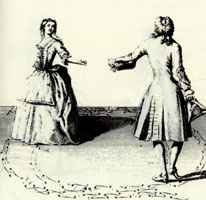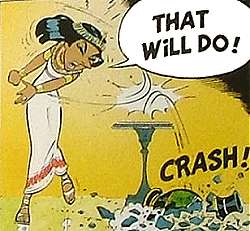Iranians Say Suspension Of Enrichment Not On Agenda
Iran said on Sunday any U.N. action over its nuclear program would be illegal and lead to confrontation.
Foreign Ministry spokesman Hamid Reza Asefi also declared yet again there was nothing the international community could do to prompt Iran to suspend uranium enrichment.
Briefing reporters, he also said Iran's antagonists over its nuclear program were driven by "political motivations."
"Countries sponsoring the draft resolution (Britain, France and the United States) have political motivations," Asefi said. "It's clear that any action by the U.N. Security Council will leave a negative impact on our cooperation with the IAEA."
He was referring to the International Atomic Energy Agency, the U.N. nuclear watchdog, which Iran has barred from making snap inspections as the dispute over the program has escalated.
"Intervention by the U.N. Security Council would change the path of cooperation to confrontation. We recommend they do not do this," Asefi said.
The U.S., Britain and France have expressed concern Iran is trying to build nuclear weapons under cover of its enrichment program and are trying to craft a U.N. resolution that would involve some measure of punishment should Iran fail to cease processing uranium. Russia and China, the other two veto-holding council members, have refused to agree to a draft resolution, calling for further diplomacy.
Iran insists the program is designed only to make fuel for reactors to generate electricity, and the IAEA says there is no evidence Iran has a nuclear weapons program.
"The U.N. Security Council should not take any action that it cannot later undo. We won't give up our rights and the issue of suspension (of enrichment) is not on our agenda," Asefi said at his weekly briefing.
The United States said Saturday it was prepared to bring a U.N. resolution on Iran's nuclear program to a vote with or without Russia and China's support but was still seeking to bridge differences and win unanimous Security Council approval.
"The optimism expressed Friday at the U.N. appeared to dissipate Saturday when Security Council members could not find common ground on a draft resolution designed to pressure Iran," said CBS News Foreign Affairs Analyst Pamela Falk. "With the foreign ministers from the world powers expected to meet in New York early next week, the pressure is building to find a unified position but threats to call a vote before an agreement is reached, combined with Vice President Dick Cheney's public rebuke of Russia are making the chance of a compromise position less likely."
"Either the U.K., France, and the U.S. have to move away from language of the resolution that allows for sanctions and the use of force in the future, or Russia and China as well as Qatar -- which does not have veto power -- will have to fundamentally change their position on that issue," Falk said, "or they walk away from the U.N., diminishing the pressure on Iran.
After an informal meeting at Britain's U.N. Mission, council members said they made progress in a paragraph-by-paragraph discussion of the draft resolution. Britain's U.N. Ambassador Emyr Jones Parry acknowledged, however, that the most contentious issues were not discussed in detail.
"We are still working to achieve unanimity ... but we're prepared to go to a vote without it," U.S. Ambassador John Bolton said. "We're not prepared to extend these negotiations endlessly ... I think it's realistic to consider this for a vote next week."
The resolution, co-sponsored by Britain and France and backed by the U.S., would make mandatory the previous Security Council demands that Iran suspend uranium enrichment, plutonium reprocessing, and construction of a heavy-water nuclear reactor.
The draft states that the "proliferation risk" posed by Iran constitutes a threat to international peace and security, and the resolution would be adopted under Chapter 7 of the U.N. Charter, which can be enforced by sanctions or if necessary military action.
Russia and China, which both have veto power, and some nonpermanent members contend that there is no evidence that Iran is pursuing nuclear weapons as the U.S. and its allies believe and they object to the call for possible "further measures" to ensure Tehran's compliance.
Russian Foreign Minister Sergey Lavrov discussed "the search for a diplomatic solution of the Iranian nuclear problem" with Secretary of State Condoleezza Rice, the Russian Foreign Ministry said in a statement Saturday.
"It is too early to say which changes should be made to the draft resolution to satisfy Russia," Russian Deputy Foreign Minister Sergei Kislyak said in Moscow on Saturday, according to the RIA Novosti, ITAR-Tass and Interfax news agencies.
Bolton said he had told the Russians and Chinese four days ago to come up with some creative way to make the resolution mandatory without Chapter 7, and was still waiting for their proposals.
"There's no dispute about the basic course of conduct that we want Iran to pursue," he said.
But Jones Parry said he did not envision a resolution without Chapter 7.
Qatar's U.N. Ambassador Nassir Al-Nasser said after Saturday's meeting that "the text language for some delegations is very unacceptable" and he is waiting for a revised text.
Tanzania's U.N. Ambassador Augustine Mahiga said the resolution should strengthen the role of the IAEA, remove the threat of further action, and "incorporate some inducements for Iranians to cooperate."
Jones Parry said he and France's U.N. Ambassador Jean-Marc de La Sabliere would now reflect on the suggestions made by council members.
"We have no intention of producing a new text at this stage," Jones Parry said, adding that the co-sponsors were still open to consider possible amendments.
Neither Jones Parry nor Bolton would predict when a revised text would be introduced.
De La Sabliere said the council would meet again on Monday, ahead of a meeting Monday evening of foreign ministers of the six key players on the Iran nuclear issue the U.S., Britain, France, Russia, China and Germany. Supporters of the resolution had hoped it would be adopted before that gathering.
"We are moving in the right direction," de La Sabliere said. "I think we have made some progress, but there is still a lot of work to do."
Bolton said he expects the ministers to talk about "the longer term policy that we need to pursue to stop Iran from achieving a nuclear weapons capability, and I think they could have that discussion on the assumption that this resolution will be adopted next week."
In Saudi Arabia, six of Iran's Persian Gulf neighbors urged Tehran on Saturday to be frank with them about its nuclear program.
The gathering discussed developments in Iran, Iraq and combatting terrorism, United Arab Emirates Foreign Minister Sheik Abdullah bin Zayed Al Nahyan told journalists.
"Iran should be transparent in dealing with the region," regarding its nuclear program, Al Nahyan said. |
 UNITED NATIONS (AP) - The United States Tuesday called for a vote this week to set up an international tribunal to prosecute suspects in the assassination of Lebanon's former prime minister, despite opposition from Russia, China and other Security Council members.
UNITED NATIONS (AP) - The United States Tuesday called for a vote this week to set up an international tribunal to prosecute suspects in the assassination of Lebanon's former prime minister, despite opposition from Russia, China and other Security Council members.
 UNITED NATIONS (AP) -- The U.N. Security Council passed a weakened resolution Monday giving Iran until Aug. 31 to suspend uranium enrichment or face the threat of economic and diplomatic sanctions.
UNITED NATIONS (AP) -- The U.N. Security Council passed a weakened resolution Monday giving Iran until Aug. 31 to suspend uranium enrichment or face the threat of economic and diplomatic sanctions. The U.N. Security Council's five permanent members and Japan agreed Monday to postpone a vote on possible sanctions against North Korea in response to a missile test that rattled the region last week. France's U.N. Ambassador
The U.N. Security Council's five permanent members and Japan agreed Monday to postpone a vote on possible sanctions against North Korea in response to a missile test that rattled the region last week. France's U.N. Ambassador  The U.N. Security Council demanded Wednesday that Iran suspend uranium enrichment, the first time the powerful body has directly urged Tehran to clear up suspicions that it is seeking nuclear weapons.
The U.N. Security Council demanded Wednesday that Iran suspend uranium enrichment, the first time the powerful body has directly urged Tehran to clear up suspicions that it is seeking nuclear weapons.  The Security Council has edged closer to sanctioning individuals blamed for last week's anti-UN violence in Ivory Coast. The movement came on Thursday as the UN mission in the Ivory Coast began a temporary evacuation of some civilian staff. "No decision has been taken today but I think we are very close to a decision (on sanctions),"
The Security Council has edged closer to sanctioning individuals blamed for last week's anti-UN violence in Ivory Coast. The movement came on Thursday as the UN mission in the Ivory Coast began a temporary evacuation of some civilian staff. "No decision has been taken today but I think we are very close to a decision (on sanctions),"  The US and France have said they are trying to mobilise support for a UN resolution demanding Syria's full cooperation with the investigation into the assassination of Lebanon's former prime minister Rafiq al-Hariri. "We will certainly insist on Syrian cooperation," US Ambassador
The US and France have said they are trying to mobilise support for a UN resolution demanding Syria's full cooperation with the investigation into the assassination of Lebanon's former prime minister Rafiq al-Hariri. "We will certainly insist on Syrian cooperation," US Ambassador  After weeks of negotiations, the UN Security Council remains deadlocked on the next steps in Sudan where a 21-year civil war has just ended and a two-year conflict that has killed an estimated 180,000 people is still raging. The council is under mounting international pressure to act quickly but members are still divided over sanctions against the government and punishment for the perpetrators of atrocities. At the request of the United States, the council voted Thursday for a second weeklong extension of the UN political mission in Sudan. But many members including France, Algeria and Britain made clear they are fed up with the delays and want a vote next week on a new resolution. "The time has come now to adopt the resolution," said France's UN Ambassador
After weeks of negotiations, the UN Security Council remains deadlocked on the next steps in Sudan where a 21-year civil war has just ended and a two-year conflict that has killed an estimated 180,000 people is still raging. The council is under mounting international pressure to act quickly but members are still divided over sanctions against the government and punishment for the perpetrators of atrocities. At the request of the United States, the council voted Thursday for a second weeklong extension of the UN political mission in Sudan. But many members including France, Algeria and Britain made clear they are fed up with the delays and want a vote next week on a new resolution. "The time has come now to adopt the resolution," said France's UN Ambassador